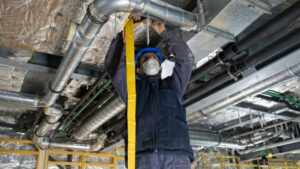Rodents Can Destroy HVAC Efficiency:
Did you know that your ductwork could be providing a warm home for rodents to nest in? Rats can wreak havoc in ductwork by chewing holes in sheet metal and duct insulation. Why do we care? As HERS Raters, part of our job involves testing duct leakage in new and altered HVAC systems. We also help to verify duct insulation requirements have been met by installers. All of this is to protect the integrity of the owner’s system by verifying the quality of installation. When an HVAC system operates efficiently, it saves the owner money, energy, and unnecessary repairs.
Our installer verification may indicate an efficient system at the time of installation, but the long-term performance of the system is dependent on the preservation of that system. Not only can rats destroy the efficiency of a system, but they can also cause electrical problems by chewing through wires. Plus, they negatively impact indoor air quality and airflow.
Prevent Rodents from Getting in Ductwork:
1. Examine and Re-Seal Ductwork Regularly 
Over time, a system may experience wear and tear. New entry points provide the opportunity for rodents, birds, or insects to get into the air ducts. Therefore, you should visually inspect your ductwork in any accessible areas (e.g. attic, crawlspace) regularly. Check for gaps and cracks at least once a year.
After your examination, you may need to patch duct insulation and leaks. This is a good DIY idea for general HVAC maintenance because it will prolong the efficiency of the system. Make sure to use the appropriate foil tapes and materials for patchwork. In place of HVAC tape, duct sealant offers a more permanent solution. If you’d like any help identifying problem areas in your system, you can always give us a call to run a diagnostic duct leakage test.
2. Cover Air Vents
In order to protect your ductwork, be sure to caulk vent covers into place. If registers are not tightly sealed, it’s possible for critters to slip by. You can also use mesh screens for additional coverage on vents and flue pipes to stop rodents from getting in. Double-check that screens are secure whenever you perform your yearly maintenance check on the system.
3. Create a Protective Barrier
The next step is to stop other traffic points throughout the building. Look at vent openings in the exterior walls, where there may be gaps between the duct and walls. Look at all other exterior penetrations, such as framing, pipes, rafters, flues, and fireplaces. Once again, you can use metal mesh as an affordable and simple method for fixing gaps and mouse holes. For more information on this topic, read our article on keeping pests out of your home.
4. Reduce Accessibility with General Maintenance
There are steps you can take to make your property less attractive to rodents and other invaders. First, make sure that water is sloping away from your property without puddling occurring. Generally, you can achieve this with proper landscaping techniques. Standing water is a magnet for all kinds of creatures. The second item also pertains to landscaping. It’s a good rule of thumb to frequently trim yard vegetation so that animals will not want to nest around the building. Specifically, you can also check the trees that are close to the property for branches that may create a bridge for pests to enter.
What To Do if Rodents Get in Your Ductwork:
If you suddenly notice an increase in your utility bills or temperature fluctuation, this may indicate a problem with the efficiency of your system that could be related to a new pest problem. Call an HVAC and/or pest control professional and resolve the issue as quickly as possible. In the meantime, there are measures you can try yourself. As a disclaimer, we are not pest professionals and you should take precautions to make sure there are no dead animals in the ductwork.
1. Prepare
Start by turning off the HVAC system. Once it has completely cooled down, you can remove the vent covers.
2. Set Traps
Load traps with food to attract the rodents in the ductwork. Put traps inside the duct openings. We never advise using poison near ducting because you don’t want dead animals left inside the ductwork or poison spreading throughout the home.
3. Check Traps
You’ll want to look at the traps at least twice a day, morning and night. Wearing gloves, make sure to dispose of any dead mice or rats properly. Once all the traps are consistently empty, you’ll know that there are no more rodents in the air ducts.
Maintaining the Efficiency of Your HVAC System:
 Now, it’s time to make a habit of servicing your HVAC system. It is good practice to have professionals inspect your air conditioning system once a year. They will look for any pest activity in the ventilation, so you can spot any issues right away. Additionally, you may want to do more thorough testing of your system once every five years or so. For example, a duct leakage test can help you to protect the functionality of your system long-term. If the test results are poor, a smoke test allows us to diagnose the source of the leakage. It’s much better to spend a little money maintaining a system rather than paying for wasted energy or worse, the larger expense of replacing a system. Are you experiencing hot and cold spots or unusually high energy bills? Contact us today for a free estimate.
Now, it’s time to make a habit of servicing your HVAC system. It is good practice to have professionals inspect your air conditioning system once a year. They will look for any pest activity in the ventilation, so you can spot any issues right away. Additionally, you may want to do more thorough testing of your system once every five years or so. For example, a duct leakage test can help you to protect the functionality of your system long-term. If the test results are poor, a smoke test allows us to diagnose the source of the leakage. It’s much better to spend a little money maintaining a system rather than paying for wasted energy or worse, the larger expense of replacing a system. Are you experiencing hot and cold spots or unusually high energy bills? Contact us today for a free estimate.
Please subscribe to our blog for more free content.


Recent Comments